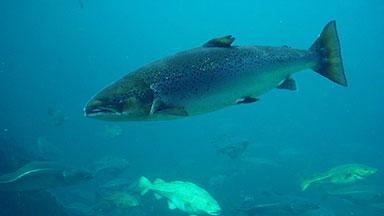Genome explains differences in wild and farmed salmon
Structural differences in salmon genomes affecting brain genes may explain behavioural changes between wild and domesticated populations.

A study of salmon has shed light on common variations in DNA that affect the function and expression of many genes, including those linked to behaviour and other traits of commercial interest.
Researchers studied almost 500 salmon to identify and map large genetic variations in the genome – documenting sections that were deleted, duplicated or inverted – to reveal some that may help explain behavioural traits seen in farmed fish.
Insights into structural variation in salmon – which can affect commercially important traits – could help inform selective breeding and support fish welfare.
Trawling data
Researchers from the Roslin Institute and University of Aberdeen led a major collaborative effort to map structural variation across the Atlantic salmon genome in 492 fish sampled around the world.
The team found that existing methods for identifying structural variation using genome sequencing data were not sufficiently accurate. They developed an approach, previously used in analysing human genomes, for efficiently checking every possible variation, resulting in almost 16,000 newly discovered high-confidence structural variants.
Their findings identify variations in genes linked to the brain and behaviour, and build on previous discoveries of behavioural differences between farmed and wild fish. For example, farmed fish tend to be less fearful of predators and more motivated to find food than wild fish, which underpins their faster growth rate. This study gives important clues to the underlying genetics.
Structural variations also appear to have been influenced by a duplication of the genome, which occurred in an ancestral salmonid fish some 100 million years ago.
The study is published in Nature Communications.
We have developed a novel method to reliably map structural variations across the salmon genome using sequencing datasets that are common in many species. These findings open the door to exploiting structural variation in salmon genetics, supporting research and applications in breeding and conservation, in addition to improving our understanding of genome biology and evolution.
** The Roslin Institute receives strategic investment funding from the Biotechnology and Biological Sciences Research Council and it is part of the University of Edinburgh’s Royal (Dick) School of Veterinary Studies. **


